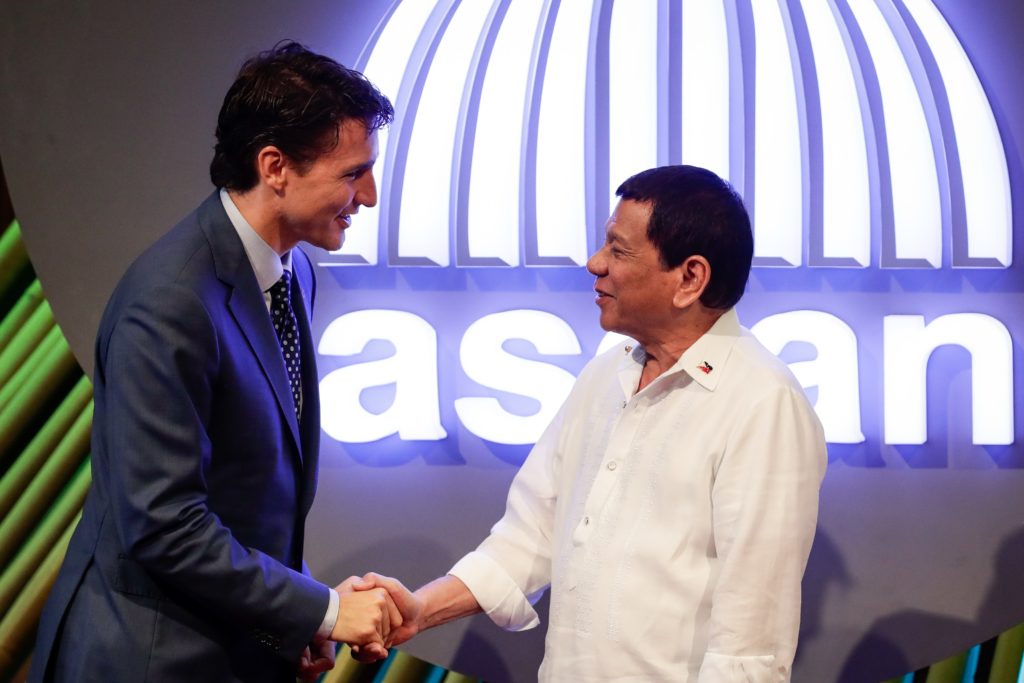HR advocates praise Trudeau over comments on Duterte’s ‘drug war’

Canadian Prime Minister Justin Trudeau (left) shakes hands with Philippine President Rodrigo Duterte (right) before the opening ceremony of the 31st Association of Southeast Asian Nations (Asean) Summit in Manila last November 13, 2017. (Pool photo by MARK R. CRISTINO / AFP FILE PHOTO)
MANILA, Philippines — Human rights advocates praised Canadian Prime Minister Justin Trudeau for publicly expressing concerns about the Philippine president’s deadly crackdown on illegal drugs, with Human Rights Watch saying the “quiet diplomacy” adopted by United States President Donald Trump and other world leaders would not stop the killings.
Trudeau told reporters in Manila on Tuesday that he raised concerns about rights abuses and extrajudicial killings in President Rodrigo Duterte’s anti-drug campaign when he met him ahead of an annual summit with Southeast Asian counterparts. He was the only one among 20 heads of state in Manila who publicly said he spoke to Duterte about it.
Asked to comment on Trudeau’s remarks, Duterte said he was angered and insulted.
Phelim Kine of US-based Human Rights Watch said late Thursday that Trudeau’s decision to speak publicly about his comments to Duterte was “deliberate, strategic and principled.”
More than a year into Duterte’s crackdown, in which thousands of people have died, Kine said that “no foreign leader, including Donald Trump and ASEAN heads of state, can reasonably be still under the illusion that soft-pedaling concerns about the ‘drug war’ will prod Duterte to stop the killings and take meaningful moves toward accountability.”
“Instead, such approaches provide foreign leaders a cynical veneer of substantive engagement while in reality merely providing Duterte the reassurance that the international community isn’t serious about accountability and that the killings can, therefore, continue,” Kine said.
Rachel Choa-Howard of Amnesty International-Philippines said Trump and the Association of Southeast Nations (Asean) largely ignored an opportunity to talk tough like Trudeau and left human rights off the table.
“It’s a shame,” she said.
The former head of the Philippines’ Commission on Human Rights, Loretta Ann Rosales, said that it was understandable for most Asean members like the Philippines that were formerly colonized by Western powers to guard their sovereignty closely.
“But after half a century, one would expect 50 years as more than enough time for Asean members to grow up and learn the rules of the trade in diplomacy.”
It was not clear what Trudeau exactly told Duterte. Duterte’s spokesman, Harry Roque, told reporters that he was “confident that beyond stating that Canada is firmly committed to human rights, nothing else was said in the private and very short talk between President Duterte” and Trudeau.
“I think you saw how emphatic he was that he will not tolerate states interfering in what the president perceives as purely domestic affairs,” Roque said of Duterte.
After Trump met Duterte in Manila on Monday, they issued a joint statement praising their countries’ enduring treaty alliance.
The two sides “underscored that human rights and the dignity of human life are essential, and agreed to continue mainstreaming the human rights agenda in their national programs to promote the welfare of all sectors including the most vulnerable groups,” said the statement, which did not specifically mention the drug killings.
Asean leaders also did not express public concern about the killings in the Philippines. The 10-nation bloc has a rule of non-interference in each member’s domestic affairs, a policy that has been used by member states to parry criticism and has allowed ASEAN to endure despite its diverse membership of nascent democracies, monarchies and authoritarian states.
Duterte is highly sensitive to criticism of his tough anti-crime methods and in the past called then-President Barack Obama a “son of a bitch” after the State Department expressed concern over the killings. /kga